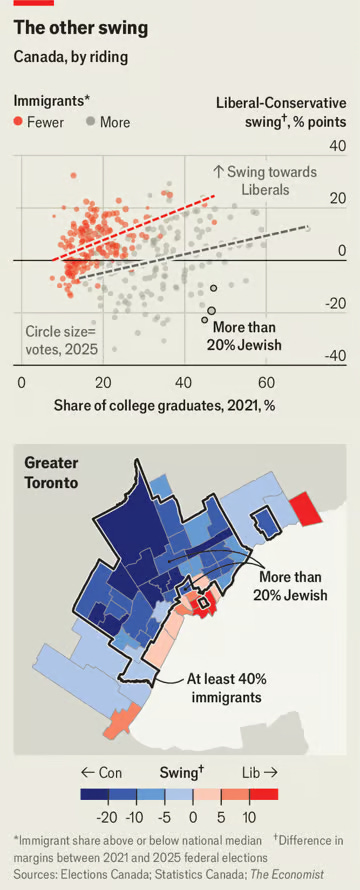
With Liberal triumph in Canada, class dealignment goes global. Meanwhile, in the United States, union growth is concentrated among healthcare and academic workers. Dustin Guastella makes the the case for American reindustrialization. Plus, new scholarship on the causes of class dealignment (Hint: it’s about status, culture, and economics).
Below you’ll find a range of news and views that concern working-class politics, class dealignment, and political strategy. Many are written by research associates and friends of the Center for Working-Class Politics.
A New Golden Age for Labor? Not So Fast
The values and political orientations of academic and healthcare workers in predominantly urban areas are likely very different than those of rural and suburban construction or manufacturing workers. If the former becomes the face of the labor movement, will it act as a vanguard or a limitation?
Ben Fong from the Center for Work and Democracy at ASU argues the outlook for labor organizing is not as hopeful as some cheerleaders might lead us to believe. While union membership has grown among urban workers in academia and healthcare, other sectors remain painfully stagnant or in decline. A focus on organizing manufacturing, logistics, and other traditionally blue-collar sectors should be part of a broader effort to reorient labor, and progressivism, to a working-class base.
The Left Misunderstood: How Voters’ Perceptions of What Matters to the Left Benefit the Right
Many working-class voters do not perceive the left as advocates for progressive economic policies. Rather, these voters increasingly perceive the left as champions of what they consider ‘elitist’, ‘urban’, or ‘woke’ cultural and identity issues, such as transgender rights or de-funding the police.
Political scientist Jonne Kamphorst describes how class dealignment is in part duet to left-wing parties failing to make their case for bold progressive economic policy. Using both existing and novel survey data, his analysis shows that a significant proportion of working-class voters believe progressive economic policies are not a priority for the Left, a perception that has strongly influenced their conservative shift.
Canada’s new Conservative movement resembles Donald Trump’s
Class dealignment goes global. Demographic trends in Canada’s recent election are eerily like those of the 2024 American presidential election. Liberals gained ground with university graduates and native-born voters while losing votes among immigrants and voters without college degrees.
Referendum to repeal anti-union law meets threshold to qualify for 2026 ballot
A group of unions and labor allies in Utah, gathered over 140,000 signatures from voters to successfully put a referendum on the 2026 ballot to repeal a law banning various public sector employees from representing their members in contract negotiations. The Protect Utah Workers coalition, led by the Utah Education Association, the state’s largest teacher’s union, is showing that voters support common sense pro-worker legislation even in deep red states.
The Case for American Reindustrialization
Center for Working-Class Politics (CWCP) Research Associate Dustin Guastella argues reindustrializing is not only popular but a path to worker driven social democracy. Manufacturing jobs not only have greater wage potential than many jobs in services, their location at points of leverage in the economy gives manufacturing workers unique bargaining power.
PS: Catch Guastella tonight, Thursday, May 8 at 7:00pm EDT, speaking in a seminar organized by the Working-Class Studies Association (WCSA). Registration is required and a zoom link will be emailed before the event.
Canada’s Election Didn’t Halt Class Dealignment
Canadian’s hate for Donald Trump may have turned them against right wing populist Pierre Poilievre, but election results show conservatives are continuing to win working class voters. Newly elected technocrat and former investment banker Mark Carney’s economic policies are likely to do little to reverse this trend.
Who Is Left Behind? Economic Status Loss and Populist Radical Right Voting
Using a novel positional measure of income which quantifies the relative economic position of a social class in the social hierarchy, Economic and Policy Analyst Giuseppe Ciccolini finds that loss of economic status, a measure distinct from financial loss, is particularly strong at driving support for far-right populist parties. This finding combined with analyses that show economic status loss boosts culturally conservative stances, suggests more reasons for why progressives should be concerned with bleeding working-class voters.
PRO-Tip: Only Some Labor Reforms Are Pro-Worker
A new survey from the American Compass finds that while Americans overall have favorable attitude toward labor unions (+36), working-class Americans show marginally less favorability than the upper class, a finding no doubt part of the broader pattern of class dealignment.



